
Mitochondrial DNA Part B-Resources
Scope & Guideline
Connecting Researchers Through Mitochondrial Insights
Introduction
Aims and Scopes
- Mitochondrial Genome Characterization:
The journal publishes studies that detail the structure, composition, and variations of mitochondrial genomes in various species, enhancing our understanding of mitochondrial genetics. - Chloroplast Genome Studies:
Research on chloroplast genomes is a major focus, with a strong emphasis on their phylogenetic implications and evolutionary significance in plant species, particularly those with medicinal or ecological importance. - Phylogenetic Analysis:
Many articles feature phylogenetic analyses based on mitochondrial and plastid genome sequences, providing insights into evolutionary relationships among taxa and contributing to taxonomic revisions. - Biodiversity and Conservation:
The journal highlights studies related to the conservation of endangered species through genomic analyses, contributing to biodiversity assessments and conservation strategies. - Next-Generation Sequencing Technologies:
Utilization of cutting-edge sequencing technologies is a prominent theme, enabling comprehensive genome assembly and analysis, which is crucial for understanding genetic diversity.
Trending and Emerging
- Comparative Genomics:
There is an increasing trend towards comparative genomic studies that analyze mitochondrial and chloroplast genomes across different taxa, providing insights into evolutionary patterns and adaptations. - Phylogeographic Studies:
Research focusing on the phylogeography of species, particularly in relation to environmental changes and geographical distributions, is gaining traction, reflecting a broader interest in ecological and evolutionary contexts. - Genomic Resources for Conservation:
Emerging themes include the development of genomic resources aimed at conservation efforts, particularly for threatened or endangered species, highlighting the journal's commitment to applied research. - Functional Genomics:
There is a growing interest in studies that explore the functional aspects of mitochondrial and plastid genomes, including gene expression and metabolic pathways, which may have implications for biotechnology and medicine. - Integration of Multi-Omics Approaches:
The journal is increasingly publishing studies that integrate mitochondrial and plastid genomic data with transcriptomic, proteomic, and metabolomic analyses, indicating a trend towards comprehensive biological insights.
Declining or Waning
- Traditional Molecular Techniques:
There is a noticeable decline in studies utilizing traditional molecular techniques such as Sanger sequencing, as the field shifts towards more advanced next-generation sequencing methods. - General Biodiversity Studies:
Papers focusing solely on general biodiversity without a genomic or phylogenetic context are becoming less frequent, indicating a shift towards more specialized genetic studies. - Basic Morphological Studies:
Research that primarily emphasizes morphological descriptions without coupling them with genomic data is waning, suggesting a preference for integrative approaches that combine morphology with molecular data.
Similar Journals

ACTA ZOOLOGICA ACADEMIAE SCIENTIARUM HUNGARICAE
Advancing the Frontiers of Zoological KnowledgeACTA ZOOLOGICA ACADEMIAE SCIENTIARUM HUNGARICAE, published by the Hungarian Natural History Museum, is a distinguished open access journal dedicated to advancing knowledge across the fields of Animal Science, Zoology, Ecology, Evolution, Behavior, and Systematics. Established in 2003 as an open access platform, this scholarly journal has actively contributed to the dissemination of critical research since 1996, positioning itself within the Q3 quartile in both its primary fields as of 2023. With its ISSN 1217-8837, ACTA ZOOLOGICA serves as a vital resource for researchers, professionals, and students aiming to explore and expand their understanding of animal biodiversity and ecology. Its publication features a variety of empirical studies, reviews, and critical commentaries that rigorously address contemporary issues in zoological sciences, underlining its commitment to fostering academic excellence and environmental sustainability. Researchers can access the journal’s extensive archives to deepen their inquiry into animal life, making it an essential addition to any academic library.
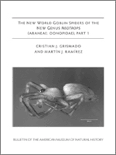
BULLETIN OF THE AMERICAN MUSEUM OF NATURAL HISTORY
Championing high-quality research for a sustainable future.BULLETIN OF THE AMERICAN MUSEUM OF NATURAL HISTORY, published by the American Museum of Natural History, represents a cornerstone of scholarly communication in the fields of Agricultural and Biological Sciences and Ecology. With an impressive impact factor highlighted by its Q1 quartile rankings in both categories, the journal publishes high-quality, peer-reviewed research that significantly contributes to the understanding of natural history. Researchers will find this journal indispensable as it covers a diverse range of topics, providing insights that drive ecological research and biological discovery forward. Although not open access, the Bulletin is widely available through institutional subscriptions, making it accessible to both established professionals and students eager to stay informed about the latest advancements in the field. Its commitment to advancing knowledge from 1996 to the present ensures that it remains relevant and highly regarded within the scientific community.
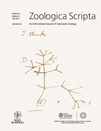
ZOOLOGICA SCRIPTA
Championing impactful studies in ecology and behavior.Zoologica Scripta, published by Wiley, stands as a distinguished journal within the fields of Animal Science and Zoology, Ecology, Evolution, Behavior and Systematics, Genetics, and Molecular Biology. With its inception dating back to 1971 and a convergence year extending to 2024, this journal consistently provides a platform for high-quality research, earning a Q1 ranking in two key categories and solid performance in additional fields, as evidenced by its significant Scopus rankings and impressive percentiles. Notably, it ranks 36 out of 490 journals in Animal Science and Zoology, placing it in the 92nd percentile. While Zoologica Scripta operates under a traditional access model, its rigorous peer-review process ensures that only the most impactful studies make their way into its pages. With a focus on advancing our understanding of biodiversity and evolutionary processes, this journal is indispensable for researchers, professionals, and students committed to the ongoing exploration of animal sciences and ecological studies.
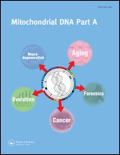
Mitochondrial DNA Part A
Navigating the Frontiers of Mitochondrial ScienceMitochondrial DNA Part A, published by Taylor & Francis Ltd, is a distinguished journal dedicated to the exploration of mitochondrial genetics and its implications for health and disease. With an ISSN of 2470-1394 and an E-ISSN of 2470-1408, this journal serves as an open-access platform, promoting the dissemination of high-quality research in the field. Operating from the United Kingdom, it offers a vital resource for researchers and professionals keen to delve into the rapidly evolving landscape of mitochondrial studies. Although currently ranked Q4 in both the Genetics and Molecular Biology categories, the journal continues to be a valuable outlet for emerging findings that could impact our understanding of cellular processes and hereditary conditions. Researchers can access articles and data covering recent advancements from 2016 through 2022, with ongoing contributions expected in 2024. As the field grows, so too does the importance of this journal as a source of knowledge and collaboration for the academic community.

Arthropod Systematics & Phylogeny
Connecting genetics and systematics in arthropod research.Arthropod Systematics & Phylogeny is a pivotal journal published by the SENCKENBERG NATURHISTORISCHE SAMMLUNGEN DRESDEN, MUSEUM TIERKUNDE in Germany, dedicated to advancing the understanding of arthropod systematics, phylogenetics, and evolutionary biology. With an ISSN of 1863-7221 and an E-ISSN of 1864-8312, this journal has established itself as a reputable source for high-quality research, evident by its ranking in the Q1 category for Insect Science and Q2 in Genetics. Covering a spectrum of subjects within the realms of agricultural and biological sciences, it caters to a diverse audience of researchers, professionals, and students eager to explore the intricate relationships and evolutionary histories of diverse arthropod taxa. The journal has been consistently publishing impactful studies since its inception in 2009, with ongoing contributions expected to bolster its presence in the academic community through 2024 and beyond. Although it currently does not offer open access options, its rich content serves as a valuable resource for those passionate about entomology and genetics, fostering collaboration and innovation in an important area of biological research.
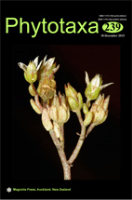
Phytotaxa
Bridging the Gap in Plant Science KnowledgePhytotaxa, published by MAGNOLIA PRESS, is an esteemed journal in the fields of Plant Science and Ecology, Evolution, Behavior and Systematics. Established to cater to the growing need for high-quality research dissemination in botany, this journal presents the latest findings in plant taxonomy, systematics, and biodiversity. With its H-Index reflecting significant academic influence, and recognized as Q2 in Plant Science and Q3 in Ecology by Scopus, it stands as a reputable source for scholars and practitioners alike. The journal operates without open access restrictions, allowing for a wider reach to its audience. Positioned in New Zealand, Phytotaxa has been pivotal since its inception, contributing to the global understanding of plant diversity and ecology from 2010 to 2024. Its rigorous peer-review process ensures the high quality of published articles, making it an essential resource for researchers, professionals, and students dedicated to advancing the field of botany.

KOREAN JOURNAL OF PLANT TAXONOMY
Pioneering insights into plant species diversity and ecology.Korean Journal of Plant Taxonomy, published by the Korean Society of Plant Taxonomists, serves as a pivotal platform for researchers and professionals in the fields of plant taxonomy and ecology. With an ISSN of 1225-8318 and a burgeoning E-ISSN of 2466-1546, this journal aims to disseminate high-quality research that contributes to our understanding of plant species diversity, classification, and evolution. Spanning the years from 2018 to 2024, the journal finds its niche within Q3 rankings in both Ecology, Evolution, Behavior and Systematics and Plant Science, reflecting its impactful contributions and relevance in the academic community. The journal's scope encompasses various studies aimed at advancing plant taxonomy in South Korea and globally. By fostering collaboration and sharing groundbreaking research, the Korean Journal of Plant Taxonomy plays a crucial role in shaping the discourse in plant sciences, making it an invaluable resource for students, researchers, and professionals alike, committed to advancing knowledge in this dynamic field.
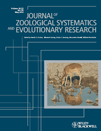
JOURNAL OF ZOOLOGICAL SYSTEMATICS AND EVOLUTIONARY RESEARCH
Unraveling Biodiversity Through Systematic ResearchThe Journal of Zoological Systematics and Evolutionary Research, published by Wiley-Hindawi, stands as a premier academic journal since its establishment, showcasing cutting-edge research in the fields of Animal Science, Zoology, and Ecology. With an impressive track record spanning from 1963 to the present, this journal has earned a Q1 classification in both Animal Science and Ecology, as well as recognized rankings in Genetics and Molecular Biology. Its impact is highlighted by its Scopus ranks, placing it in the top percentile for relevant categories, underscoring its vital role in advancing knowledge and understanding within these disciplines. Researchers, professionals, and students will find a wealth of high-quality, peer-reviewed articles that contribute to the evolutionary understanding of biodiversity and systematics. Though not an Open Access journal, it remains accessible to a wide audience committed to exploring the intricacies of zoology and evolutionary biology.

PLANT SYSTEMATICS AND EVOLUTION
Exploring the Roots of Evolutionary SciencePlant Systematics and Evolution is a prestigious journal published by Springer Wien, dedicated to advancing research within the fields of plant taxonomy, evolution, and ecology. With its ISSN 0378-2697 and E-ISSN 1615-6110, this journal has been pivotal in shaping the scientific landscape since its inception in 1974. Based in Austria, it occupies a significant position in the academic community, being ranked in the Q2 quartile in both Ecology, Evolution, Behavior and Systematics and Plant Science as of 2023. This high-impact journal is recognized for its rigorous peer-review process and is indexed among the top publications in its category, holding a Scopus rank of #176 out of 516 in Plant Science and #252 out of 721 in Ecology, highlighting its relevance and quality in the research community. Although it does not currently offer open access, the journal is committed to making significant contributions to the understanding of plant biodiversity and evolutionary processes. This makes it an essential resource for researchers, professionals, and students aiming to know the latest developments in the study of plant systematics and evolution.

PAKISTAN JOURNAL OF ZOOLOGY
Innovating animal biology insights from Pakistan and beyond.Pakistan Journal of Zoology, established in 1975 and published by the Zoological Society of Pakistan, is a pivotal resource in the field of zoology and animal science, contributing to the academic discourse and research advancements in the region. With an ISSN of 0030-9923, this journal strives to disseminate innovative research findings and scholarly articles that explore various facets of animal biology, ecology, and conservation. Although classified in the Q4 quartile within the animal science category, its commitment to providing a platform for emerging researchers makes it crucial for those in the zoological community. The journal covers a broad range of topics relevant to contemporary issues in zoology, promoting both local and international collaborations. Situated in Lahore, Pakistan, its contributions are vital for promoting biodiversity awareness and conservation efforts within the region. Accessible research outputs empower students and professionals alike to engage in critical discussions and applications within the disciplines of zoology and animal science.